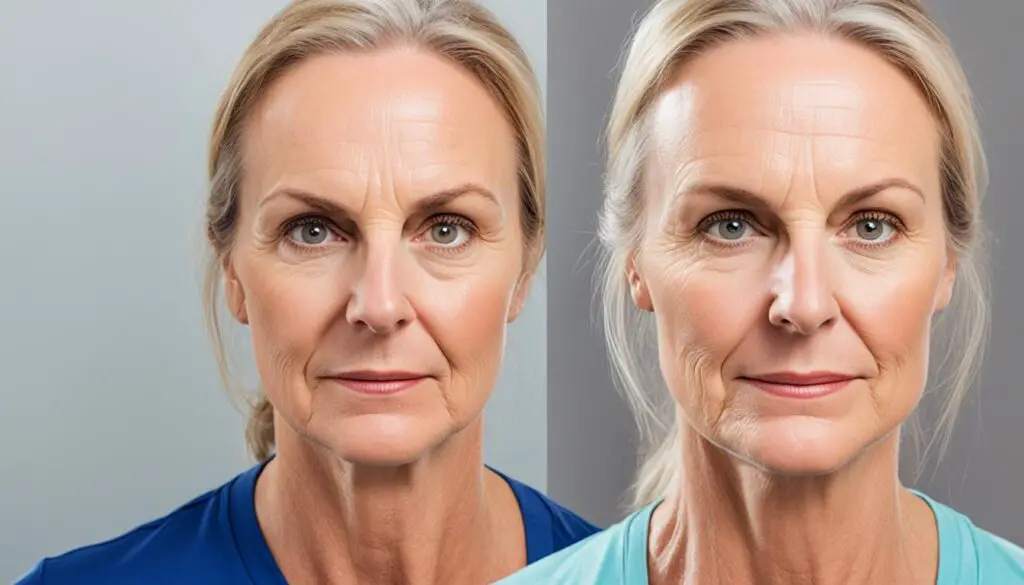Did you know that the HCG drops diet, an extreme weight loss approach, can put your health at risk? According to the Food and Drug Administration (FDA), over-the-counter HCG diet products have not been proven to be safe or effective for weight loss. In fact, some research suggests a possible increase in cancer risk associated with the use of HCG weight-loss products.
The HCG drops diet involves severe calorie restriction, typically consuming only 500 to 800 calories per day. Such extreme diets can have serious health risks, including gallstone formation, irregular heartbeat, vitamin and mineral deficiencies, and an electrolyte imbalance. Reported side effects of the HCG drops diet include fatigue, irritability, restlessness, depression, fluid buildup, and even swelling of the breasts in males.
It is crucial to prioritize your health and consult with a healthcare provider for safer and more sustainable weight loss methods. Opting for a balanced diet and regular exercise can lead to long-term success without the potential risks and side effects of the HCG drops diet.
Key Takeaways:
- The HCG drops diet is an extreme weight loss approach that has not been proven safe or effective for weight loss according to the FDA.
- Severe calorie restriction and the use of HCG weight-loss products can lead to serious health risks and side effects.
- Reported side effects of the HCG drops diet include fatigue, irritability, restlessness, depression, and fluid buildup.
- Consulting with a healthcare provider is crucial for safe and sustainable weight loss methods.
- Choosing a balanced diet and regular exercise is a safer alternative to the HCG drops diet.
The Controversy Surrounding the HCG Diet
The HCG diet has stirred up significant controversy due to its extreme approach to weight loss and the use of HCG, a hormone produced during pregnancy. While some proponents claim its effectiveness, there are alarming concerns raised by the FDA and healthcare professionals, prompting a closer look at the potential risks associated with the HCG drops diet.
FDA Warning on HCG Diet
The Food and Drug Administration (FDA) has issued a warning against the use of over-the-counter HCG diet products. These products are considered illegal and have not been proven to be effective for weight loss. The FDA requires these products to carry labels indicating their ineffectiveness. This cautionary stance highlights the lack of scientific evidence supporting the HCG diet and the potential health risks it may pose.
Risks of Using HCG Diet Products
Using HCG diet products for weight loss comes with inherent risks. The use of HCG for weight loss is not approved by the FDA, and its safety has not been established. The potential side effects and health risks associated with these products cannot be ignored. It is crucial to be aware that there are illegal and unauthorized HCG diet products on the market that may pose unknown dangers and jeopardize your health.
Illegal HCG Diet Products
It is essential to be cautious when purchasing HCG products as there are illegitimate and unapproved versions circulating in the market. These illegal products may not adhere to regulatory standards, making them potentially harmful and ineffective. Buying from reputable sources and consulting with healthcare professionals is paramount to ensure your safety.
The Controversy Unveiled
The HCG drops diet controversy puts the spotlight on the lack of scientific evidence, potential health risks, and the illegal nature of many HCG diet products. This brings into question the credibility and safety of this weight loss approach. As with any diet or weight loss program, it is crucial to prioritize your well-being by seeking professional guidance and adopting evidence-based, sustainable strategies to achieve your weight loss goals.
| Key Points | Summary |
|---|---|
| The FDA warns against over-the-counter HCG diet products | These products are illegal and lack proven effectiveness |
| Using HCG for weight loss is not approved and may pose risks | Healthcare professionals urge caution when using HCG diet products |
| Beware of illegal HCG diet products in the market | Ensure you purchase from reputable sources and consult with professionals |
Potential Side Effects of the HCG Drops Diet

The HCG drops diet can have a range of side effects and health risks that individuals should be aware of before considering this weight loss approach. While some individuals may experience initial weight loss on the HCG drops diet, it is important to understand the potential adverse reactions and dangers associated with it.
Some commonly reported side effects of the HCG drops diet include:
- Fatigue
- Irritability
- Restlessness
- Depression
- Fluid buildup (edema)
- Swelling of the breasts in males (gynecomastia)
These side effects can significantly impact an individual’s overall well-being and quality of life. In addition to these common side effects, there are other more serious concerns associated with the HCG drops diet.
The HCG drops diet poses the risk of blood clots forming and blocking blood vessels, a condition known as thromboembolism. This can have serious consequences on cardiovascular health and overall well-being. It is important to be cautious of this potential danger.
Moreover, the severe calorie restriction of the HCG drops diet can lead to other health risks and dangers. These include:
- Gallstone formation: Due to rapid weight loss and reduced caloric intake, there is an increased risk of gallstone formation, which can cause severe pain and complications.
- Irregular heartbeat: Severe calorie restriction can disrupt the normal rhythm of the heart, leading to an irregular heartbeat or even more serious cardiac issues.
- Limited intake of essential vitamins and minerals: The extremely low calorie intake of the HCG drops diet can result in deficiencies of essential nutrients, which are necessary for optimal health and functioning.
- Electrolyte imbalance: The imbalanced intake of nutrients can also disrupt the body’s electrolyte balance, leading to potential complications and adverse health effects.
Considering these potential side effects and health risks, it is crucial to consult with a healthcare provider before starting the HCG drops diet. A healthcare provider can assess an individual’s unique health profile, discuss the potential risks, and provide guidance on safe and effective weight loss options. It is important to prioritize overall health and well-being when pursuing any weight loss program.
Lack of Scientific Evidence for the Effectiveness of the HCG Drops Diet
Despite the popularity of the HCG drops diet, there is a lack of scientific evidence supporting its effectiveness for weight loss. The FDA has not approved HCG for over-the-counter use and has stated that it does not work for weight loss. While some research has linked HCG weight-loss products to a possible increase in cancer risk, there is limited scientific evidence to support this claim.
In order to make informed decisions about our health, it is important to rely on evidence-based weight loss methods. Scientific studies play a critical role in understanding the effectiveness and safety of diet programs. However, when it comes to the HCG drops diet, there is a notable absence of robust scientific research.
Without sound scientific evidence, it is difficult to determine the true efficacy of the HCG drops diet. While individual testimonials and anecdotes may convey positive results, they do not substitute for rigorous scientific studies. It is important to approach weight loss with a critical mindset and seek out reliable, evidence-based methods.
| Table: Lack of Scientific Evidence for the Effectiveness of the HCG Drops Diet |
|---|
| No significant scientific studies supporting the efficacy of the HCG drops diet |
| The FDA has not approved HCG for weight loss and has stated that it does not work |
| Limited research linking HCG weight-loss products to a possible increase in cancer risk |
| Individual testimonials and anecdotes do not substitute for scientific evidence |
Despite the lack of scientific evidence, it is important to note that individual experiences may vary. Some individuals may experience temporary weight loss while following the HCG drops diet. However, it is crucial to prioritize health and well-being by seeking out weight loss methods that are supported by scientific research and recommendations from healthcare professionals.
If you are considering the HCG drops diet or any other weight loss program, it is essential to consult with a healthcare provider who can provide guidance based on your individual needs and circumstances. They can help you navigate the complex landscape of weight loss options and recommend evidence-based strategies that prioritize your overall health.
Health Risks of Severe Calorie Restriction
Severe calorie restriction, such as the 500 to 800 calories per day recommended on the HCG drops diet, can pose significant health risks. The risks associated with low-calorie diets can have detrimental effects on your overall well-being, and it is crucial to be aware of these dangers when considering extreme weight loss methods.
One of the important risks of severe calorie restriction is the formation of gallstones. When the body is deprived of sufficient calories, the liver releases more cholesterol into the bile, which can then contribute to the development of gallstones.
Another health risk is the potential for an irregular heartbeat. The heart relies on a steady supply of energy from food to function properly. When calories are severely limited, the heart may not receive the necessary fuel, leading to irregular heart rhythms.
Furthermore, very low-calorie diets can result in deficiencies of essential vitamins and minerals. These deficiencies can weaken the immune system, impair organ function, and reduce bone density, increasing the risk of osteoporosis.
Additionally, severe calorie restriction can disrupt the balance of electrolytes in the body. Electrolytes are essential for proper nerve and muscle function, and an imbalance can lead to weakness, muscle cramps, and even cardiac arrhythmias.
Other health effects of low-calorie diets include fatigue, irritability, and depression. When the body is not receiving enough energy from food, it can impact cognitive function and mood, leading to feelings of exhaustion, mood swings, and increased stress levels.
In summary, severely restricting calories can have detrimental effects on your health and well-being. It is important to prioritize safe and sustainable weight loss methods that promote a balanced intake of calories, essential nutrients, and long-term overall wellness.
Dangers of Very Low-Calorie Diets: A Comparative Analysis
| Health Risks | Severe Calorie Restriction | Safe and Balanced Weight Loss Approaches |
|---|---|---|
| Gallstone Formation | Increased risk | Minimal risk |
| Irregular Heartbeat | Potential risk | Low risk |
| Vitamin and Mineral Deficiencies | High risk | Low risk |
| Electrolyte Imbalance | High risk | Low risk |
| Fatigue, irritability, depression | Common side effects | Less common side effects |
It is evident from the comparative analysis that severe calorie restriction entails higher risks of various health complications compared to safer and balanced weight loss approaches. The importance of adopting sustainable methods that consider both short-term and long-term health cannot be overstated. Consultation with a healthcare professional is crucial in developing a personalized weight loss plan that prioritizes your well-being and achieves lasting results.
Safer Alternatives for Weight Loss

If weight loss is your goal, there are safer and more sustainable alternatives to the HCG drops diet. It is recommended to consult with a healthcare provider to develop a personalized weight loss plan that includes a balanced diet and regular exercise. These approaches promote gradual and sustainable weight loss, without the potential risks and side effects associated with severe calorie restriction and the use of HCG. Remember, weight loss should be approached in a healthy and balanced way, focusing on overall well-being rather than extreme methods.
Instead of resorting to drastic measures like the HCG drops diet, there are safe weight loss methods that can help you achieve your goals without compromising your health. Here are some healthy weight loss alternatives:
- Focus on a balanced diet: Rather than severely restricting calories, opt for a well-rounded meal plan that includes a variety of nutrient-dense foods. This ensures that your body receives all the necessary vitamins, minerals, and macronutrients for optimal health.
- Incorporate physical activity: Regular exercise is essential for weight loss, as it helps burn calories, build muscle, and improve overall fitness. Find activities that you enjoy and make them a part of your daily routine. Aim for at least 150 minutes of moderate-intensity aerobic activity or 75 minutes of vigorous-intensity activity per week.
- Practice portion control: Paying attention to portion sizes can be an effective strategy for managing weight. By eating smaller portions, you can reduce calorie intake without feeling deprived. Use smaller plates and bowls to help control portion sizes.
- Implement healthy lifestyle habits: Along with diet and exercise, it’s important to adopt other healthy habits that support weight loss, such as getting adequate sleep, managing stress, and staying hydrated.
By focusing on these sustainable weight loss approaches, you can achieve your goals while prioritizing your overall well-being. Remember, losing weight is not just about the number on the scale, but about improving your health and lifestyle. Consulting with a healthcare provider can provide you with the guidance and support needed to create an effective and personalized weight loss plan.
Importance of Consulting with a Healthcare Provider
When embarking on a weight loss journey, it is crucial to seek consultation with a healthcare provider before starting any program, including the HCG drops diet. Your health matters, and professional guidance can make a significant difference. By consulting with a healthcare provider, you can receive a thorough evaluation of your individual health status, ensuring that any weight loss plan is tailored to your specific needs and goals.
A healthcare provider can provide invaluable healthcare guidance for weight loss. They can help you navigate the intricacies of safe weight loss practices, ensuring that you are following the most appropriate approach for your body and lifestyle. Furthermore, they can monitor your progress, making any necessary adjustments along the way to optimize your success.
Professional advice for safe weight loss is key to ensuring your journey is both effective and sustainable. Your healthcare provider can offer evidence-based strategies, helping you make informed decisions based on proven methodologies rather than fads or misinformation. They can also provide insights into the potential risks and side effects associated with certain weight loss methods, arming you with the knowledge needed to make choices that prioritize your overall well-being.
Consultation with a healthcare provider for weight loss is particularly vital because everyone’s body is unique. What may work for one person may not work for another. By seeking professional advice, you can receive personalized recommendations that take into account your specific circumstances, optimizing the likelihood of achieving your weight loss goals while also ensuring your safety and long-term success.
Remember, your health is your most precious asset. Prioritizing professional guidance and support is an investment in your well-being that will pay dividends throughout your weight loss journey and beyond.
“Your health matters, and professional guidance can make a significant difference.”
The Need for Evidence-Based Weight Loss Methods

When it comes to weight loss, it is crucial to adopt evidence-based strategies that are backed by scientific research. These methods have been extensively studied and proven to be effective and safe. In contrast, the HCG drops diet lacks sufficient scientific evidence to support its effectiveness and safety. Therefore, it is advisable to prioritize weight loss approaches that are supported by research and recommended by healthcare professionals.
Evidence-based weight loss strategies involve a scientific approach to weight loss, focusing on methods that have been rigorously tested and proven to produce reliable results. These methods take into account the physiological and psychological factors involved in weight management.
- One evidence-based weight loss strategy is calorie restriction, which involves consuming fewer calories than the body needs to maintain its current weight. This creates an energy deficit and leads to weight loss over time.
- Another effective approach is increasing physical activity levels. Regular exercise not only burns calories but also improves overall health and increases metabolism.
- The inclusion of nutrient-dense foods, such as fruits, vegetables, whole grains, and lean proteins, is also a key component of evidence-based weight loss strategies. These foods provide essential nutrients while keeping calorie intake in check.
By following evidence-based weight loss methods, individuals can make informed decisions about their weight loss journey. They can have confidence that their chosen approach is grounded in scientific research and has a higher likelihood of success compared to unproven methods.
Scientific research is the foundation for developing effective weight loss strategies. It provides valuable insights into the complex process of weight management and helps individuals make informed decisions about their health and well-being.
By prioritizing evidence-based weight loss methods, individuals can minimize the potential risks and side effects associated with unproven weight loss approaches. Consulting with a healthcare professional is crucial in selecting the most suitable and effective strategy, ensuring personalized guidance and support throughout the weight loss journey.
Benefits of Evidence-Based Weight Loss Methods
| Benefits | Evidence-Based Weight Loss Methods |
|---|---|
| Scientifically proven effectiveness | ✔ |
| Sustainable long-term results | ✔ |
| Minimized risks and side effects | ✔ |
| Personalized guidance and support | ✔ |
Long-Term Sustainability of Weight Loss

One of the key factors in achieving successful weight loss is the ability to maintain it in the long term. While extreme diets like the HCG drops diet may result in rapid weight loss initially, studies have shown that a significant number of individuals tend to regain the lost weight within a few years. This highlights the importance of adopting sustainable weight loss strategies that promote lasting results.
In order to achieve long-term weight loss maintenance, it is crucial to establish healthy lifestyle habits that are both effective and realistic. This includes incorporating balanced nutrition, regular physical activity, and positive behavior changes into your daily routine.
Implementing a balanced nutrition plan: A sustainable weight loss approach involves consuming a well-rounded diet that includes all the essential nutrients your body needs. Focus on consuming a variety of whole foods, including lean proteins, fruits, vegetables, whole grains, and healthy fats. Portion control and mindful eating also play a significant role in maintaining weight loss in the long run.
Regular physical activity: Engaging in regular exercise is vital not only for weight loss but also for overall health and well-being. Aim for at least 150 minutes of moderate-intensity aerobic activity or 75 minutes of vigorous-intensity aerobic activity each week, along with muscle-strengthening activities at least twice a week. Find activities that you enjoy to make exercise a sustainable part of your lifestyle.
Positive behavior changes: Building healthy habits and adopting a positive mindset are crucial for sustained weight loss. Focus on setting realistic goals, staying motivated, and finding healthy ways to cope with stress. Surround yourself with a supportive network, whether it be friends, family, or a support group, to help you stay on track and maintain your progress.
By incorporating these sustainable weight loss strategies into your daily life, you can increase the chances of achieving long-term success. Remember, weight loss is a journey, and prioritizing your overall well-being is key to maintaining a healthy lifestyle for years to come.
| Benefits of Sustainable Weight Loss Strategies |
|---|
| Long-term weight maintenance |
| Improved overall health and well-being |
| Reduced risk of chronic diseases |
| Increased energy levels |
| Enhanced self-esteem and body confidence |
| Improved sleep quality |
| Reduced stress levels |
Conclusion
In conclusion, the HCG drops diet, with its severe calorie restriction and use of HCG, is an extreme weight loss approach that may yield initial results for some individuals. However, it is important to consider the potential risks and side effects associated with this diet. Reported side effects include fatigue, irritability, restlessness, depression, fluid buildup, and the risk of blood clots. Furthermore, the severe calorie restriction can lead to gallstone formation, irregular heartbeat, vitamin and mineral deficiencies, and electrolyte imbalances.
Considering the potential health risks and lack of scientific evidence supporting its effectiveness, it is advisable to seek safer and more sustainable weight loss approaches that prioritize overall health and well-being. Consulting with a healthcare provider can provide personalized guidance and help develop a balanced weight loss plan that includes a nutritious diet and regular exercise.
It is essential to prioritize long-term sustainability when it comes to weight loss. Extreme diets may offer rapid results, but maintaining the weight loss over time can be challenging. Incorporating healthy lifestyle habits, such as balanced nutrition, regular physical activity, and positive behavior changes, into your daily routine can contribute to successful long-term weight management.
FAQ
What are the side effects of the HCG drops diet?
Some reported side effects of the HCG drops diet include fatigue, irritability, restlessness, depression, fluid buildup (edema), and swelling of the breasts in males (gynecomastia).
What are the negative effects of the HCG drops diet?
The HCG drops diet can have adverse reactions such as gallstone formation, irregular heartbeat, limited intake of essential vitamins and minerals, and an electrolyte imbalance.
Are there any risks associated with the HCG drops diet?
Yes, there are risks of blood clots forming and blocking blood vessels (thromboembolism) with the use of the HCG drops diet.
Is the HCG drops diet approved by the FDA?
The FDA has advised against the use of over-the-counter HCG diet products, stating that they are not approved and have not been proven to be safe or effective for weight loss.
What are the dangers of the HCG drops diet?
The dangers of the HCG drops diet include potential side effects such as fatigue, irritability, restlessness, depression, fluid buildup, and the risk of blood clots, as well as the risks associated with severe calorie restriction.
Is there scientific evidence supporting the effectiveness of the HCG drops diet?
No, there is a lack of scientific evidence supporting the effectiveness of the HCG drops diet for weight loss.
What are the health risks of severe calorie restriction?
Severe calorie restriction can lead to gallstone formation, irregular heartbeat, vitamin and mineral deficiencies, and an imbalance of electrolytes.
Are there safer alternatives for weight loss?
Yes, it is recommended to consult with a healthcare provider for safer and more sustainable weight loss alternatives, such as a balanced diet and regular exercise.
Why is it important to consult with a healthcare provider before starting the HCG drops diet?
Consulting with a healthcare provider is important to assess individual health status, receive guidance on safe weight loss practices, and develop a personalized weight loss plan.
Why is it important to rely on evidence-based weight loss methods?
Evidence-based weight loss methods have been scientifically proven to be effective and safe, ensuring a healthier and more successful weight loss journey.
How can I achieve long-term sustainability in weight loss?
Long-term weight loss success can be achieved by incorporating balanced nutrition, regular physical activity, and positive behavior changes into your daily routine.




